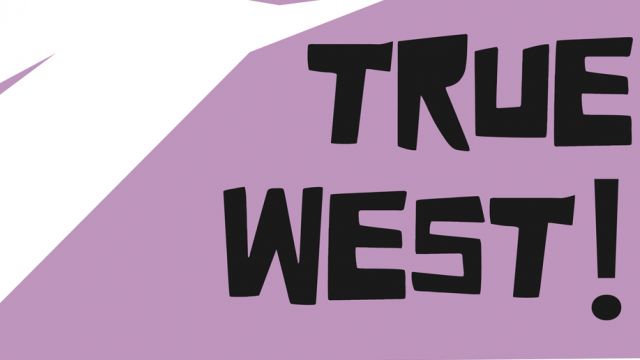True West
True West is not a piece of theatre to be taken lightly. It is confronting, powerful, and at times very uncomfortable to watch. The audience rides a bronco throughout this play - it bucks and jolts and throws us to the ground on many occasions. Unlike a bronco ride, however, which is jarring and fairly mindless, True West is confrontational and thought-provoking.
The play opens with two contrasting images: a focused screen writer working hard on his script, dressed conservatively at a kitchen table; and with a similar shadow, looming ominously - a cowboy, framed against a desert backdrop - a foreboding of an impending clash of ideologies and cultures.
Sam Shepard’s True West is an American play about two brothers caught up in a cycle of violence and aggression borne of ancestry. Premiering in 1980 at the Magic Theatre in San Francisco, this latest incarnation, presented by local actors Marko Siklich and Ronnie Greenwell, certainly packs a punch.
It is difficult to lock down one overall message of the play as we grapple with issues like sibling rivalry, the curse of family history, hereditary destiny, and the collapse of the American Dream rolled into two hours of heightened emotion, drama and violence. The Old West was a place of adventure, wide-open country and a life unshackled from the routines of social convention. The play contrasts this with the urban American dream of self-made wealth and success, specifically in this case represented by Hollywood filmmaking.
Austin, played by Greenwell, and Lee, played by Siklich, are two estranged brothers who haven’t seen each other for five years. The play is set in their childhood home in the San Gabriel Mountains, 40 miles from Los Angeles. Austin is an Ivy League-taught, aspiring screenwriter, and Lee is a drifter and thief returned from time in the Mojave Desert. Lee arrives and interrupts Austin’s screenwriting peace at the home, which Austin is minding for his mother (Caroline Mignone) who is away in Alaska. There is reference throughout the play to the boys’ estranged father who lives in the desert, an alcoholic and no-hoper. Austin is desperately attempting to prepare a script idea to pitch to Saul (Rick Mills) and the confrontations begin almost immediately as Lee interrupts his writing with constant demands to borrow his car.
Austin is a literate man, married with kids. Lee is unsettled, loud, and a small-time criminal with rage that’s impossible to ignore. Austin is well versed at how to calmly manage his brother’s anger but the play flips dramatically when Saul shows up and Lee persuades him to play golf with him. During this, Lee sells Saul on his own script idea — and unfortunately for Austin, Saul decides to dump Austin’s script in favour of Lee’s. It is from this point that we see Austin grow progressively more upset, becoming drunk, then angry, culminating in a violent confrontation with Lee. It is in this moment we understand that they are two sides of the same coin. Austin realizes that his entire identity and goals are wrong. He needs to form his own identity and wants to give up everything and retreat to the desert with his brother- the desert representing the promise of life outside the boundaries. Austin is the representative of the order created by the new West while Lee is the representative of the desert old West and chaos
Robbie Greenwell is excellent as Austin. His development of character is excellent- nailing the conservative Ivy League graduate in the first act, then building a drunken, at times comic (the toast scene has to be seen to be believed), angry brother, fighting back. His physicality is amazing and it is most certain that he sustains many bruises in his falls and attacks.
As Lee, Marko Siklich is scary. He is a volcano of anger and emotion. Releasing this more as a simmering anger may have developed our uncertainty more, as his emotions are heightened from the instant we meet him. That said, Siklich’s physical presence and booming voice are commanding and riveting.
Rick Mills as Saul, the Hollywood producer is convincingly manipulative and self-serving, whilst Caroline Mignone’s brief appearance as the ‘blurred’ mother is outstanding in its simplicity and pathos.
The set design for True West, by Hayley Green and Zac Fry, is clever: a suburban kitchen which is itself transparent - simply a house frame - perhaps an analogy for the tenuous structures on which we base our lives. The small stage is intimate but in some of the fight scenes, choreographed by Ryan Cortazzo, there was some concern amongst the audience about the integrity of the set and props and the actors’ wellbeing, as some brawling spilled dangerously close to front row patrons.
This is a very clever play but is not easy to watch. The crumbling of the American Dream, represented by Austin and the contrasting wildness of his brother Lee cleverly cross and meld, showing that both are really not that different from each other. Just as their lives are destroyed, so too is the set, which on exiting the theatre is a stark reminder of how what we believe to be true can be thrown into complete turmoil very easily.
Shelley Hampton
Subscribe to our E-Newsletter, buy our latest print edition or find a Performing Arts book at Book Nook.

